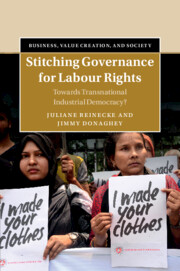Book contents
- Stitching Governance for Labour Rights
- Business, Value Creation, and Society
- Stitching Governance for Labour Rights
- Copyright page
- Contents
- Figures and Tables
- Foreword
- Foreword
- Acknowledgements
- Abbreviations
- 1 Introduction
- 2 The Democratic Deficit of Global Supply Chains
- 3 Democratic Representation
- 4 After Rana Plaza
- 5 Representative Alliances in the Creation of the Bangladesh Accord
- 6 Creating Representation through Industrial Democracy versus CSR
- 7 When Transnational Governance Meets National Actors
- 8 Building Representative Structures at the Workplace Level
- 9 Conclusion
- Book part
- References
- Index
7 - When Transnational Governance Meets National Actors
The Politics of Exclusion in the Bangladesh Accord
Published online by Cambridge University Press: 09 March 2023
- Stitching Governance for Labour Rights
- Business, Value Creation, and Society
- Stitching Governance for Labour Rights
- Copyright page
- Contents
- Figures and Tables
- Foreword
- Foreword
- Acknowledgements
- Abbreviations
- 1 Introduction
- 2 The Democratic Deficit of Global Supply Chains
- 3 Democratic Representation
- 4 After Rana Plaza
- 5 Representative Alliances in the Creation of the Bangladesh Accord
- 6 Creating Representation through Industrial Democracy versus CSR
- 7 When Transnational Governance Meets National Actors
- 8 Building Representative Structures at the Workplace Level
- 9 Conclusion
- Book part
- References
- Index
Summary
Institutions of transnational industrial democracy are emerging, as demonstrated in the book. However, the relationship between these transnational structures and national systems has often been overlooked. Chapter 7 thus focuses on the relationship between transnational industrial democracy and national institutions in Bangladesh: the relationship between the Bangladesh Accord, on the one hand, and national actors from the industry association and government of Bangladesh, on the other. For national actors, the imposition of private labour governance through the Accord undermined local democratic institutions, and thus became highly contentious. This highlights the trade-off between effectiveness and inclusiveness of private governance. While collective action from over 200 signatory companies has been vital in driving factory owners to remediate urgent safety issues, it also created quasi-authority to regulate and close sites of production by withdrawing orders from unsafe or non-cooperative factories. Overall, Chapter 7 raises challenging questions about democratic governance and the intersection of transnational and national spheres.
Keywords
- Type
- Chapter
- Information
- Stitching Governance for Labour RightsTowards Transnational Industrial Democracy?, pp. 146 - 172Publisher: Cambridge University PressPrint publication year: 2023



